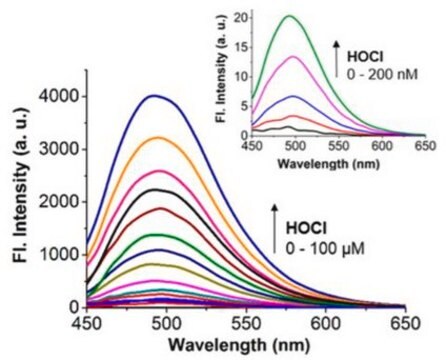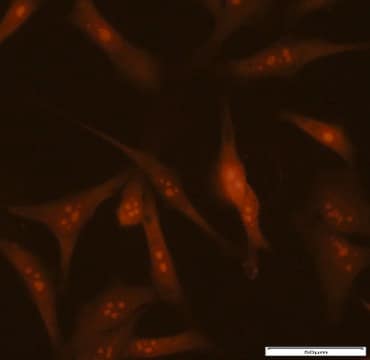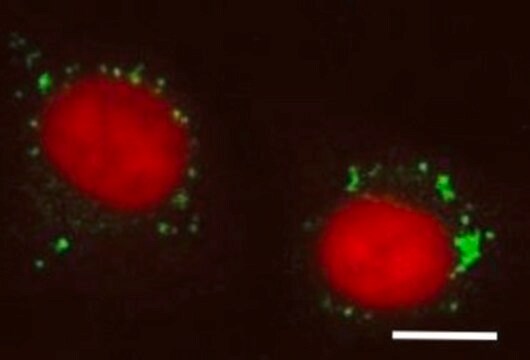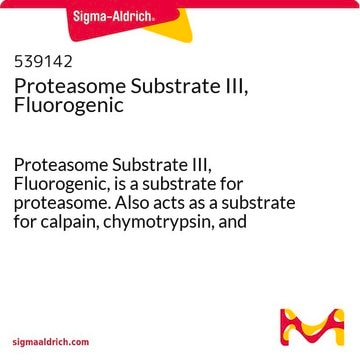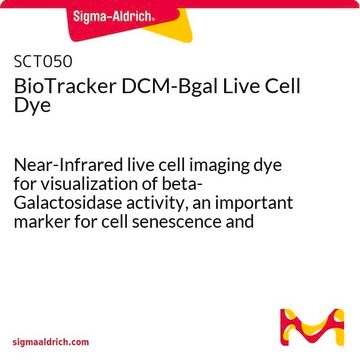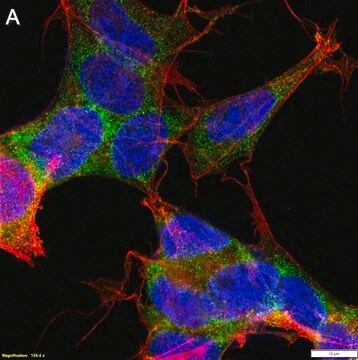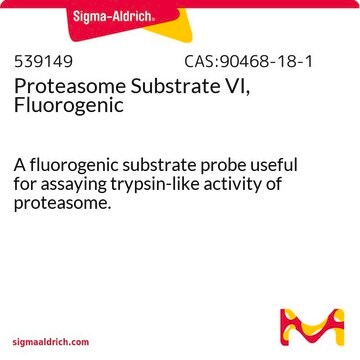SCT235
BioTracker™ TAS2 Proteasome Activity Live Cell Probe
Human
Synonym(s):
BioTracker™ TAS2 Proteasome Activity Live Cell Probe, proteasome activity live cell probe, proteasome activity probe
About This Item
Recommended Products
product name
BioTracker™ TAS2 Proteasome Activity Live Cell Probe,
biological source
human
Quality Level
form
lyophilized solid
packaging
vial of 500 μg
manufacturer/tradename
Millipore
technique(s)
activity assay: suitable
cell culture | stem cell: suitable
flow cytometry: suitable
shipped in
dry ice
storage temp.
−20°C
General description
TAS2 is a substrate-based fluorescent probe intended to be cleaved and released by the eukaryotic 20S core particle subunit of the proteasome to monitor proteasome activity. TAS2 demonstrates keen selectivity and resistance to nonspecific cleavage by proteases in human serum. The BioTracker™ TAS2 Proteasome Activity Probe can be used effectively in applications such as live cell assays, flow cytometry, or live-cell fluorescent microscopy.
MW=1407.12 g/mol
Probe is soluble in DMSO. Working final concentration of probe was 5 - 30 uM in appropriate growth media for 90 minutes.
SPECTRAL PROPERTIES
Excitation max λ: 496 nm
Emission max λ: 524 nm
Imaging was performed with a 488 nm excitation laser and emission window of 515-555 nm.
Zerfas BL, Coleman RW, Salazar-Chaparro AF, Macatangay NJ, Trader DJ. 2020. Fluorescent Probes with Unnatural Amino Acids to Monitor Proteasome Activity in Real-Time. ACS Chemical Biology. 15(9):2588–2596. doi:https://doi.org/10.1021/acschembio.0c00634.
Application
Features and Benefits
Target description
Improper proteasome function has been associated with a number of diseases including a variety of cancers. This makes the proteasome a high-interest target for further study and potential therapeutic development.
Physical form
Storage and Stability
Other Notes
Legal Information
Disclaimer
Signal Word
Danger
Hazard Statements
Precautionary Statements
Hazard Classifications
Resp. Sens. 1
Storage Class Code
11 - Combustible Solids
WGK
WGK 3
Flash Point(F)
Not applicable
Flash Point(C)
Not applicable
Certificates of Analysis (COA)
Search for Certificates of Analysis (COA) by entering the products Lot/Batch Number. Lot and Batch Numbers can be found on a product’s label following the words ‘Lot’ or ‘Batch’.
Already Own This Product?
Find documentation for the products that you have recently purchased in the Document Library.
Our team of scientists has experience in all areas of research including Life Science, Material Science, Chemical Synthesis, Chromatography, Analytical and many others.
Contact Technical Service
